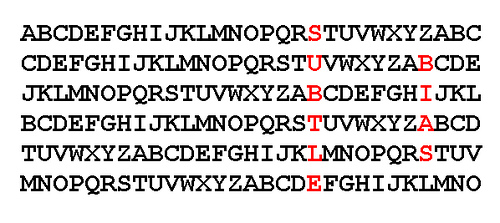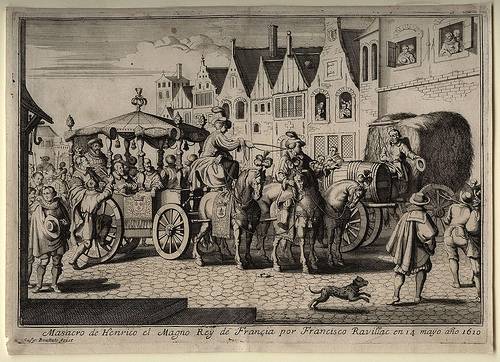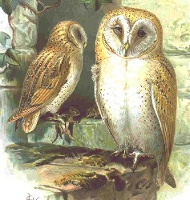
Language
This Sceptred Isle
There was a young fellow named Cholmondeley,
Who always at dinner sat dolmondeley.
His fair partner said,
As he crumbled his bread,
“Dear me! You behave very rolmondeley!”
Said a man to his spouse in east Sydenham:
“My best trousers! Now where have you hydenham?
It is perfectly true
They were not very new,
But I foolishly left half a quydenham.”
A young Englishwoman named St John
Met a red-skinned American It John
Who made her his bride
And gave her, beside,
A dress with a gaudy bead Frt John.
There was a young vicar from Salisbury
Whose manners were quite halisbury-scalisbury.
He went around Hampshire
Without any pampshire
Till his bishop compelled him to walisbury.
(Thanks, Gavin.)
Too Late

After François Ravillac assassinated Henry IV of France in 1610, it was discovered that
HENRICUS IV GALLIARUM REX (“Henry IV, King of the Gauls”)
can be rearranged to spell
IN HERUM EXURGIS RAVILLAC (“From these Ravillac rises up”)
His predecessor, Henry III, was also assassinated–his killer’s name, Frère Jacques Clement, can be anagrammed to spell C’est l’enfer qui m’a créé — “hell created me.”
Punctual
‘Mind your stops’ is a good rule in writing as well as in riding. So in public speaking, it is a great thing to know when to stop and where to stop. The third edition of a treatise on English Punctuation has been recently published, with all needful rules for writers, but none for speakers. The author furnishes the following example of the unintelligible, produced by the want of pauses in the right places:
Every lady in this land
Hath twenty nails upon each hand;
Five and twenty on hands and feet.
And this is true, without deceit.If the present points be removed, and others inserted, the true meaning of the passage will at once appear:
Every lady in this land
Hath twenty nails: upon each hand
Five; and twenty on hands and feet.
And this is true without deceit.
– Harper’s New Monthly Magazine, June 1855
“Palindromic Conversation Between Two Owls”

“Too hot to hoot!”
“Too hot to woo!”
“Too wot?”
“Too hot to hoot!”
“To woo!”
“Too wot?”
“To hoot! Too hot to hoot!”
– George Marvill, New Statesman weekend competition, May 5, 1967
In a Word
accismus
n. feigned disinterest in a desired object
His and Hers
Many masculine nouns can be converted to feminine with a suffix, as HERO-HEROINE and HOST-HOSTESS.
Name a feminine noun that can be converted to masculine with a suffix.
It Begins

Sumer is icumen in,
Lhude sing cuccu!
Groweth sed, and bloweth med,
And springth the wude nu–
Sing cuccu!
— English round, 1260
Winter is icumen in,
Lhude sing Goddamm,
Raineth drop and staineth slop,
And how the wind doth ramm!
Sing: Goddamm.
— Ezra Pound, 1917
The names of the 12 months can be anagrammed into these lines:
Merry, durable, just grace
My every future month embrace;
No jars remain, joy bubble up apace.
But poet and journalist George Ellis (1753-1815) summed them up this way:
Snowy, Flowy, Blowy,
Showery, Flowery, Bowery,
Moppy, Croppy, Droppy,
Breezy, Sneezy, Freezy.
In a Word
hindermate
n. a companion who hinders; opposite of helpmate
Fitting

… balances. The bottom half of each letter mirrors the top.
